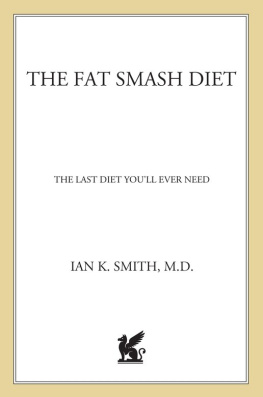To Sharon Lieteau, M.D., who shed new light on subjects that wouldve remained dark for me thanks to her brilliant expertise in psychiatry, generous enthusiasm, willingness to share, and prodigious knowledge of the mind. You are always a cheerleader and great sounding board. I value both and never take either for granted. I love you.
And a big thanks to all of my followers who have asked me for years to write a book about the mental aspects of dieting, and how to find motivation and keep it. Mind over Weight is in honor of you!
When you think about quitting, think about why you started.
Motivation just might be the holy grail for weight loss and for many other of lifes challenging endeavors. Motivation is the X factor, that special ingredient on which the success of the entire recipe stands. You can have the best diet plan ever created, as many trainers as money can buy, private chefs at your beck and call, but if you dont have motivation to start and follow, success will only be a distant pipe dream. Every year, thousands of people purchase diet books and gym memberships, then never once crack the book or cross the turnstile. Without motivation, the best intentions are merely creations of ones imagination. If you want to have at least something of a chance to win the game, then you cant stay on the sidelines wondering what it would be like to get your chance to take a swing.
Motivation is not something that can be gifted, learned, or copied; rather its something that must come from within. Motivation is extremely personal, not something that others can prescribe for you or define for you. Unfortunately, for most people, finding it can seem like an endless search. The truth, however, is that all of us actually possess motivation, but not everyone knows how to unlock it. The mission of this chapter is to help you find and unlock that motivation and understand how to keep it alive and readily accessible. But first lets take a look at the concept of change and its stages that can put you on the road to long-term weight loss success.
In the early 1980s, two well-known researchers, Prochaska and DiClemente, looked at smokers who were able to quit on their own and compared them to smokers who required further treatment. Their study question was quite simple: Why could some quit on their own and others couldnt? The centerpiece of their findings was that people quit smoking if they were ready to do so. Given their examination through various studies, the researchers developed something called the Transtheoretical Model (TTM), also referred to as the Stages of Change Model. This is a model of intentional change and focuses on the decision-making of the individual. After all these years, this model is still applicable and widely used by therapists helping clients and patients make successful behavioral changes.

The TTM assumes that people dont change behaviors quickly, that change is continuous and occurs in a cyclical process. Studies have shown that people move through a series of stages when modifying their behavior. The original five stages of the model are: precontemplation (not ready), contemplation (getting ready), preparation (ready), action, and maintenance.
PRECONTEMPLATION. People in this stage simply are not ready and dont intend to take action in the foreseeable future (usually the next six months). At this point, people are often unaware that their behavior is problematic or can result in negative consequences. They tend to think that others are exaggerating how seriously problematic their behavior is or can be. Precontemplation can seem like reluctance, resistance to being told what to do, resignation to fate by giving up hope that change can occur, or rationalization of behavior. Precontemplators have all the answers as to why they dont need to change what theyre doing.
CONTEMPLATION. People in this stage recognize that their behavior is problematic and that there is hope for change. These people tend to be on the fence. They are open to the possibility of change but arent completely convinced and havent made the actual decision to change. There is an intention to change within the next six months, but beyond that, there is no real definition to the commitment. Contemplators are vulnerable to reverting to the precontemplation phase.
PREPARATION. This is the stage where things really start to happen. This is the stage of readiness. People are committed and intend to take immediate action (typically within the next month). Those in this stage begin to take small steps toward the larger behavior change, and they now truly believe that changing their behavior can lead to a healthier life. All their ambivalence has not been completely resolved, but no longer is it a barrier to change. People will have a plan of action, such as signing up at a gym or purchasing a structured diet plan. When someone is in preparation phase, they are now ready for action-oriented programs.
ACTION. This is the stage where people get busy. People have recently changed their behavior (defined as within the last six months) and have serious intentions of continuing to move forward with the change or changes they have made. Those in the midst of action will have shown a modification of their problematic behavior(s) or have begun to acquire healthy new behaviors.
MAINTENANCE. People in this stage are pretty far down the road of commitment and action. They have made specific lifestyle changes and are working to prevent a relapse. In the maintenance stage people grow increasingly confident that they can continue to pursue change and not slip back into one of the previous stages.
Its important to identify what stage youre in before starting your program. If you are in the precontemplation phase, its essential that you are honest with yourself. Its nothing to be ashamed about. Its very normal to say that you want to lose weight, but there can be lots of reasons why you simply arent ready to do so. The important thing here is that you dont start. Trying to start a program when you arent ready for the change and your motivation isnt where it needs to be will most likely be a futile exercise destined for failure. At the end of this chapter you will have an opportunity to figure out your readiness for change.
Some people spend significant time in the contemplation phase, considering their options and trying to figure things out. Others, however, move through this phase relatively quickly and enter the preparation phase. Many fail in their selected diet program, not because the plan theyve picked is ineffective, but because they simply started it at a time when they werent convinced they could achieve success, or they werent ready to begin the changes necessary for the plan to work. The process of changing ones lifestyle and behavior requires the alignment of many factors that work in a chain reaction, and the lead domino is timing.



















